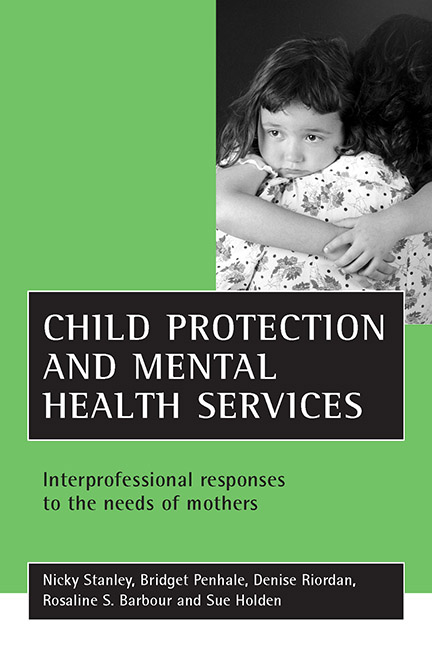Book contents
- Frontmatter
- Contents
- List of tables and figures
- Introduction
- one Mental health needs and mothering
- two The service context
- three Interprofessional work
- four The research study
- five Identifying key research issues
- six Mothers’ perspectives
- seven The mothers’ evaluations of professional support
- eight The professionals and their practice
- nine Conceptualising needs and evaluating risk
- ten Interprofessional communication and coordination
- eleven Identifying appropriate resources
- twelve Conclusion
- References
- Index
- Also available from The Policy Press
five - Identifying key research issues
Published online by Cambridge University Press: 20 January 2022
- Frontmatter
- Contents
- List of tables and figures
- Introduction
- one Mental health needs and mothering
- two The service context
- three Interprofessional work
- four The research study
- five Identifying key research issues
- six Mothers’ perspectives
- seven The mothers’ evaluations of professional support
- eight The professionals and their practice
- nine Conceptualising needs and evaluating risk
- ten Interprofessional communication and coordination
- eleven Identifying appropriate resources
- twelve Conclusion
- References
- Index
- Also available from The Policy Press
Summary
The focus groups
Since no previously validated questionnaires that addressed the issues tackled by the study were available, the research team was faced with the task of developing one that was appropriate for a wide range of professional groups, spanning both mental health and child care services. Qualitative approaches have been used extensively in the pilot phase of projects, both to inform the formulation of research questions and the selection of variables for study and to develop survey instruments (Barbour, 1999). In this study, focus group discussions with health and social care staff working in an area outside the two research sites were held to assist the development of contextually relevant questions for inclusion in the survey of professionals (Dumka et al, 1998). Focus groups have been shown to be particularly effective in accessing members’ constructions and attributions of meaning (Bloor et al, 2001), and are thus ideal for testing the acceptability and interpretations of the language used in questionnaires. Since the aim was to develop a survey instrument that was relevant for a variety of professional groups, a range of practitioners needed to be involved in this stage of the study. Given the potentially large number of workers involved in service provision for families where parents have mental health problems, it was not feasible to hold profession-specific groups. Instead, the research team opted for three interprofessional focus groups. These mirrored or approximated the real-life context of case conferences and had the added advantage that they were likely to afford insights into the issues arising for professionals in the practice environment (Kitzinger and Barbour, 1999).
Since the principal reason for holding focus groups was to inform the design of the questionnaire, it was more important for recruitment purposes than is usually the case in focus group research to convene groups that were representative of the wider population to be studied (Bloor et al, 2001). Therefore, the groups involved a range of staff with different professional roles and remits, working in both the statutory and voluntary sector, and with varying levels of seniority and experience. Those recruited included representatives of the following professional groups: child care social workers; health visitors; adult psychiatrists; mental health social workers; community psychiatric nurses (CPNs); children's guardians; practitioners from voluntary organisations serving mental health services users, and from similar organisations for children; and middle managers from both community health and social services.
- Type
- Chapter
- Information
- Child Protection and Mental Health ServicesInterprofessional Responses to the Needs of Mothers, pp. 47 - 54Publisher: Bristol University PressPrint publication year: 2003



